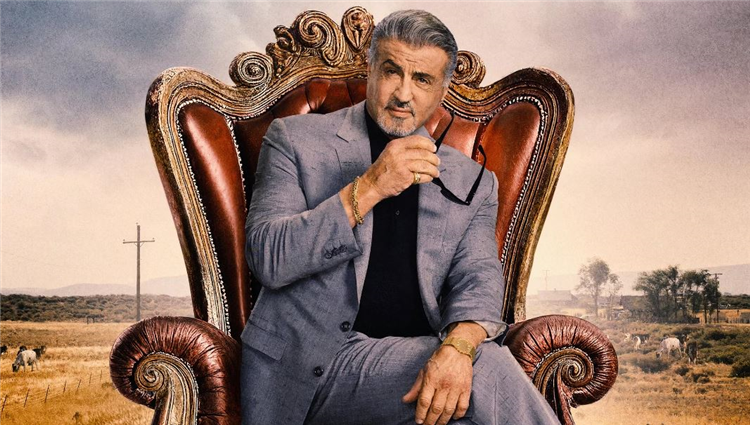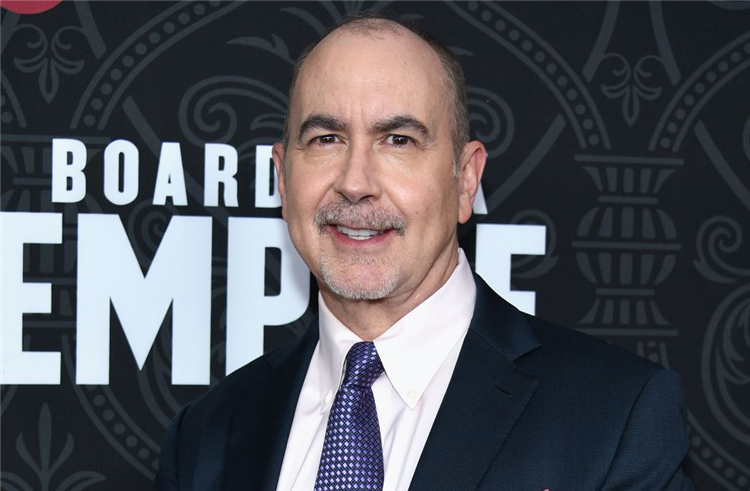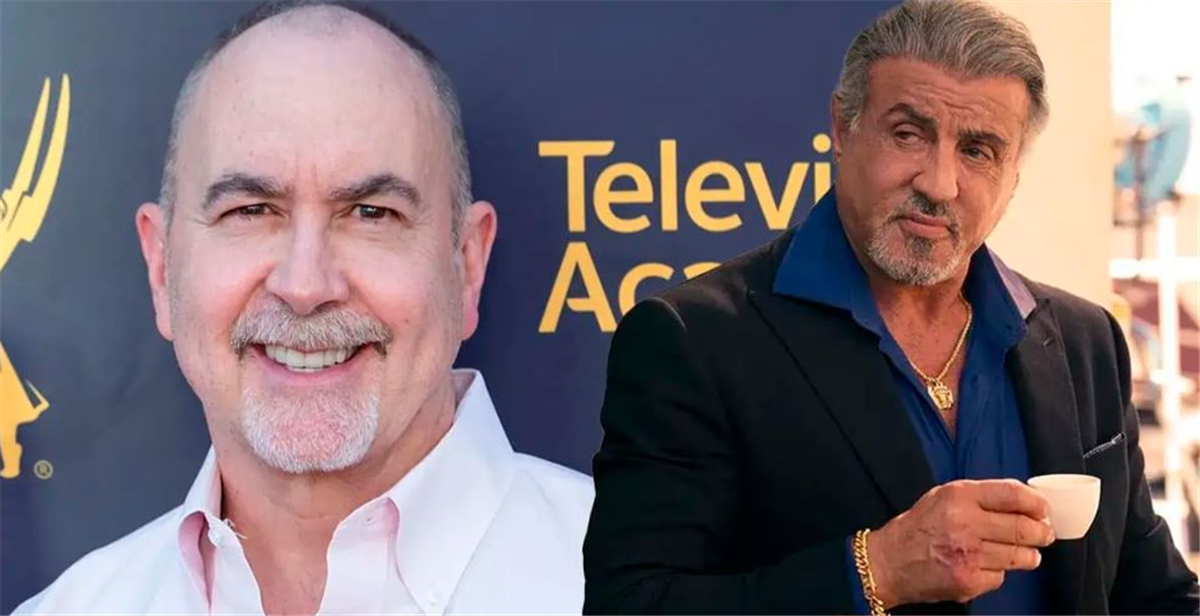Terence Winter is one of the hardest-working writers in Hollywood. He rose to prominence as a writer and executive producer on The Sopranos and went on to create the series Boardwalk Empire and Vinyl and write the screenplays for The Wolf of Wall Street and Bob Marley: One Love, earning an Academy Award nomination for the former. He’s currently a writer and executive producer for Paramount+’s crime dramedy series Tulsa King, which returns for Season 2 on Sept. 15.
Tulsa King, which was created by superproducer Taylor Sheridan of the Yellowstone franchise, stars Sylvester Stallone as Dwight “The General” Manfredi, a New York mafioso whose family exiles him to Tulsa, Okla. In Season 1, he establishes himself as a player in his unexpected new home, ultimately breaking from his old family and starting his own misfit crew. But at the end of Season 1, Dwight is arrested by Stacy (Andrea Savage), his ATF agent love interest, who makes a choice between Dwight and the law. As Season 2 picks up, Dwight is dealing with that legal trouble while also trying to repair his relationship with his daughter, Tina (Tatiana Zappardino), and his grandsons, continue to build his business in Tulsa, and fend off new foes, including Tulsa businessman Cal Thresher (Neal McDonough) and Kansas City mobster Bill Bevilaqua (Frank Grillo).
Winter almost didn’t return for Season 2. He served as the showrunner for Season 1, but left the series after Season 1 amidst creative differences. Fortunately, those differences got resolved, and schedules worked out after the writers strike last year for Winter to return in a new capacity as an executive producer and writer focused on the series’ scripts, with more production-side duties handled by director/EP Craig Zisk. Like most other series from 101 Studios, the series does not have a traditional showrunner.
Winter spoke with TV Guide about what’s coming up in Tulsa King Season 2, his relationships with Taylor Sheridan and Sylvester Stallone, what it’s like being a native New Yorker in Oklahoma, and much more.
What’s new and different in Tulsa King Season 2?
Winter: The fact that we now get to really learn more about our characters throughout the course of the season. Season 1 is a great opportunity to set the table, get to know who everybody is and their relationships to each other. And the great thing about Season 2 of anything is you get to expand on that. A little more of the backstory, a little more of the relationships between people. There’s also sort of this magic that happens when you put two actors in a scene who have never worked together before, and you go, ‘Oh my God, this is great. We gotta get more of this.’ So you get to see that as the season progresses, too. You get a further expansion of Dwight’s world, with a lot more about his backstory, and his attempts to repair his relationship with his daughter and his sister and build a relationship with his grandsons. And obviously he’s got some new challenges that face him this year, in the form of two antagonists who come in. Neal McDonough is one of them, and then Frank Grillo, who plays another guy who goes up against Dwight.
Who are some of those different character combinations who you put together and said, “Oh yeah, this is great”?

Winter: We get to see Jay Will [who plays Tyson, Dwight’s driver and right-hand man] and Max Casella [who plays Manny, Dwight’s former New York family member who fled to Tulsa and eventually joined Dwight’s new outfit] a little bit. We see Garrett Hedlund [who plays Mitch Keller, an ex-rodeo star and bar owner who’s one of the toughest members of Dwight’s crew] and Dwight’s daughter a little bit together. We saw a little of Martin Starr [who plays Dwight’s financial wiz Bodhi] and Jimmy the Creek [a Native American heavy played by Glen Gould] last season, but we get a little more. Those are a couple of good examples of relationships that progress throughout the year.
Frank Grillo’s character, Kansas City mob boss Bill Bevilaqua — is that a reference to Matthew Bevilaqua from The Sopranos?
Winter: No, you know, it’s so funny. I forgot all about Matthew Bevilaqua until after I had decided on that name. I don’t know, maybe they’re distant relatives in the fictional universe. That was his very ill-fated second cousin from New Jersey.
That’s so funny! And here I was like, “Oh, it’s sort of like a joke, because Frank Grillo could have been on The Sopranos; he’s that type of guy.”
Winter: Absolutely. I’m surprised he wasn’t. I mean, there’s so many things in the back of your head. On Boardwalk Empire, there’s a character played by Michael Shannon, Van Alden, who was a federal agent. I just kinda came up with that name. But then I realized, when I would drive to my mother-in-law’s house, I would pass a street called Van Alden. I was like, ‘Oh my God, that’s where I got that from and I didn’t even know it.’
You left Tulsa King after Season 1 for what was reported as creative differences. And knowing what I know about the very specific way Taylor Sheridan works, I believe that’s true. What can you say about why you left and what brought you back?
Winter: Taylor had written the original pilot, and then just said, “Here, take it and run with it and do your thing.” And I did, and, I inferred that he or they were not particularly happy with where I wanted to take the show. And I said, “Well, look, the idea was that this was going to be my thing, and if you guys want to do something different, then fine.” And then, you know, I guess we would all talk about it and said, “You know what? On second thought, this actually is working, let’s just stick with it and do that.” And it was a big kumbaya moment, and all things were forgiven, and we just moved ahead, which I’m very happy about.
That’s great, because the show was a hit, and why mess with what’s working?

Winter: You know, Taylor’s extremely hands on with everything he’s done. And I can’t speak for him, because I’m not him. He certainly has his right to his opinion. This is a show he created. But at a certain point, he’s like, “You know what, you’re doing it, so go.” And like I said, we just moved on.
What’s your relationship with him and Sylvester Stallone now, especially now that Mr. Stallone is a credited writer on the show?
Winter: I honestly have only met Taylor in person one time two years ago. He wrote the original version of the pilot, like I said, and then I kind of took it over, so he hasn’t really been involved in the development or the production of the show. So I don’t really talk to him, we just do the show. It’s Stallone who’s really my creative partner here, and he’s phenomenal. With him, you don’t only get an actor, you get a writer, a producer, a director, an editor, all of it. He’s incredibly detail oriented and really invested in the show and in the character. He looks at the character like, “This is me.” The best compliment I got when he read my pilot is he said, “This is tailor-made for me. This is who I am. This is who I would be if I were a mob guy. This is exactly how I talk,” et cetera. So he’s got opinions about everything Dwight does and works really hard, to the point where his fingerprints are on everything, even on scripts he’s not credited on. He’ll give me ideas, and he’ll tweak dialogue and send me thoughts and give me notes. You know, it’d be very easy for him to just come in and go, “OK, what do I say? What do I do?” and just do the show. But he’s really invested in the show and the success of it, and who Dwight is.
When you have disagreements about character or story, how do you navigate those with him?
Winter: Well, I just agree with him. [Laughs.] I just let him have his way. I’m not stupid. He is Rocky, after all. No, that’s absolutely not true. I will. We will get into it sometimes, and we’ll both state our case, and usually we come to a happy medium. But for the most part, we’re on the same page with who Dwight is and what he would do or not do. What I love about him is, he’s not the kind of actor that always tries to protect himself and make himself look good. He doesn’t mind being the butt of the joke, or being self-deprecating, or letting Dwight make the wrong decisions. He doesn’t always have to be right on the show, which is great. I think there are many actors who would be like, “Oh no, I have to be infallible, and I always have to know the right thing to do.” And his character makes mistakes, and I think he embraces that, and I think that’s what makes him more of a relatable person.
I know you’re a native New Yorker and Los Angeles resident. What have you learned about the rest of the country doing this show?
Winter: I learned that Oklahoma is hot as hell in the summer, and also, like the song says, the wind really does come sweeping down the plain. It was windy, and it was like being in the Sahara Desert, or what I would imagine the Sahara Desert was like. And, you know, people aren’t that much different. Obviously New Yorkers are a little more cynical and rough around the edges, but people are basically the same wherever. We’re all just trying to get through the day and feed ourselves and our families. But it was actually a pleasure. I got to live in Oklahoma City for a while, and it was very cool. I really liked it there a lot.
But the show moved to Georgia for Season 2.
Winter: Yeah, that was production considerations, which I don’t really get involved with. I’m just sort of in the creative department. You tell me where we’re shooting, and that’s where I’ll go. But it worked out well. Atlanta’s got a great infrastructure and a ton of crew people and stage space and everything. Also hot as hell, not unlike Oklahoma, but not as windy, but also great food and all that stuff. So it was a little different, but it was great. A lot of the interiors, it doesn’t matter where you do those, of course, because you’re inside, and then exterior was a little challenge, trying to get things to match Oklahoma. But we also did shoot in Oklahoma as well, so you get to see those exteriors, so I don’t think people are going to notice the difference as we move on.
Are there any of your own fish-out-of-water experiences of stuff that happened to you in Oklahoma City or wherever that made it into the show?
Winter: Initially, I went to Tulsa for three days to just sort of walk around, and I was just struck by how many stores had signs on them that said “No guns allowed.” Like every store. There’s a lot of guns out here, apparently. And as a New Yorker, everywhere else feels slow. Even when I got to Los Angeles, I felt like it was Mayberry in comparison. Everything is like, just take it easy. Even more so in Oklahoma, it’s like, just relax. It’s fine. At one point, I was in a van, and there was a car blocking the van, and the other New Yorker with me said to the driver, “Just honk.” And they said, “We don’t do that here.” If you’re at a red light and the person in front of you doesn’t see the red light, they will wait for two minutes instead of just lightly honking. You don’t do that. This ain’t New York.
How do you feel about the state of the industry right now, with “survive ’til ’25” and all the uncertainty?
Winter: You know, since I’ve been doing this, a million years ago, every year some people would say, “This is the worst year ever. It’s never been this bad.” I finally believe them. This is actually the worst year ever. This has been really hard. There are so many people out of work. Development is really slow. It’s been really challenging for friends of mine in the business to get things set up, or get people to say yes, or even get people to meet about new projects. So I hope “survive ’til ’25” is accurate, and that it does turn around, because it’s pretty bleak out there. It’s unlike anything I’ve ever seen before, and I’m very happy and blessed to be working. I hope it turns around, because it’s bad for a lot of people.
Tulsa King Season 2 premieres Sunday, Sept. 15 on Paramount+. Season 1 is available to stream now.
